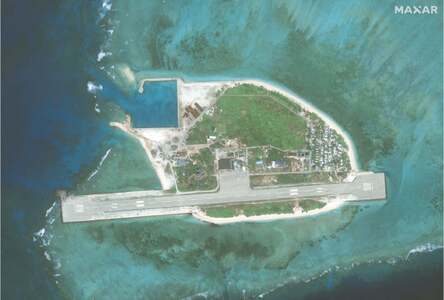 GJIROKASTER (Albania): Diehard supporters of Albania’s late Stalinist dictator, Enver Hoxha, joined his son to celebrate the 100th anniversary of his birth on Monday, hoping history would one day restore his now-tarnished image.
GJIROKASTER (Albania): Diehard supporters of Albania’s late Stalinist dictator, Enver Hoxha, joined his son to celebrate the 100th anniversary of his birth on Monday, hoping history would one day restore his now-tarnished image.
Hoxha’s widow, Nexhmije, and his son Ilir wanted to welcome visitors inside three-storey stone mansion where he was born, but authorities refused to let them use the house which now serves as the town’s ethnographical museum.
Albanian Prime Minister Sali Berisha called the celebration “monstruous and shameful”.
“He persecuted, interned, jailed and executed a quarter of the Albanians. The efforts to celebrate the dictator’s 100th anniversary aim to legitimate the terror, the barbarism, the slavery and the isolation he imposed on the Albanians.”
Graffiti in red showing Hoxha’s communist star, the acronyms of the Communist party Hoxha led, his name and date of birth are all over Gjirokaster. Some has been whitewashed or written over in black ink by detractors.
“All who came here and many others elsewhere have told me positive things, but the media has censored them. I think it is nonsense that they are afraid of a dead dictator,” Ilir Hoxha told Reuters.
“His power does not consist in what appears in the media but in what he has done for his people, the Albanians in Kosovo, Macedonia and Montenegro, the ethnic Greeks and the Cham Albanians in Greece.”
Asked by reporters if the family felt guilty about the repression and persecution under Hoxha’s rule, Ilir, who in the past spent a year in jail for defending his father, said, “Everything happened according to the law.”
Enver Hoxha was born on October 16, 1908, and after leading the World War Two resistance, ruled Albania for 40 years as one the world’s most reclusive and oppressive states. He died on April 11, 1983.
He destroyed mosques and churches and banned religion, closed the borders and in a bout of paranoia built thousands of pillbox bunkers across the Adriatic and Ioanian Sea coastlines.
Today most Albanians condemn Hoxha’s rule as a dark period.
Although still largely rural, the country has seen fast economic growth and a building boom in recent years as it tries to catch up with wealthier European nations.
In Gjirokaster, amid booming songs and speeches against the backdrop of a larger-than-life picture of Hoxha, dozens of supporters hailed him for changing Albania from a feudal country to a developed nation with free schools and education.
“Yes, food was rationed sometimes, but everyone had enough,” said Sofie Halo, 73, who came to the rally holding an old picture of Hoxha and cried when she met his son.
“Now we have everything but I have no money and dare not go out for a coffee.”—Reuters














































Dear visitor, the comments section is undergoing an overhaul and will return soon.